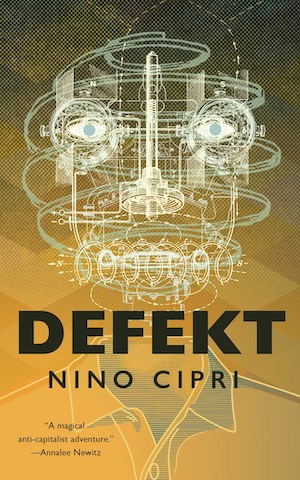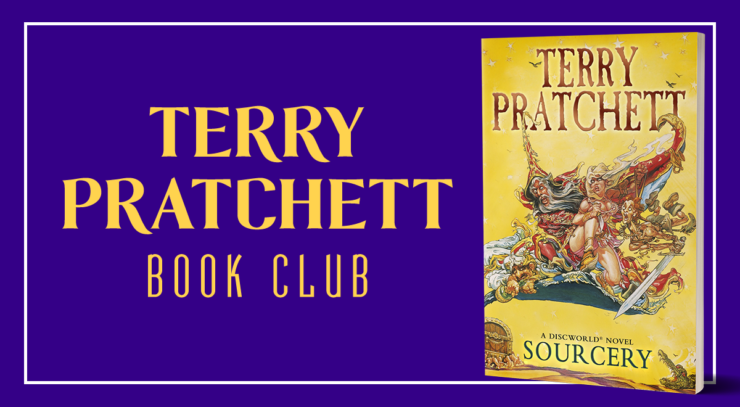Sometimes the genie of the lamp is just busy, and really doesn’t have time for your wishes, okay?
Summary
A group of wizards, led by one Benado Sconner, have been sent to set the library on fire. Before they can manage it, the Librarian attacks, leading Sconner to decide that they must kill him. Nijel is proceeding to do nothing very impressive to stop the guards in the harem, so Rincewind tries using magic again, but doesn’t need to—Conina knocks them out. The Luggage wakes up a few miles outside the city in the desert, hungover and sad and determined to get back to where it belongs, coming across a basilisk, a chimera, and other obstacles on its way back. Conina and Nijel get a look at each other and it’s an instant mutual crush, but both of them make Rincewind promise not to tell each other about their relative heritages (being Cohen’s daughter and a three-day-old barbarian hero). Conina also explains that in the harem, she had been asked to tell the Seriph a story about small fluffy bunnies. The wizards are proceeding to take over Al Khali, and Conina and Nijel are concerned about this new brand of wizard when Abrim steps out wearing the Archchancellor’s hat.
The hat is speaking through Abrim, having overpowered his mind—it plans to fight back against the Sourcerer and this new brand of wizard, and command that Conina, Nijel, and Rincewind follow. Rincewind knows this is gearing up to be the biggest magical showdown since the actual Mage Wars of old, a war from when wizards all had the power of a sourcerer and fought each other relentlessly, back when the world was new and full of unbridled magic. Abrim in the hat goes head to head with a wizard and uses the power of sourcery to kill him. In the ensuing trash talk session, Rincewind finds he can move, and he, Conina, and Nijel run. They make it several rooms away, then pause, trying to decide what to do next. While there, they note that a drunken Creosote has been buried under some rubble and unearth him. They ask if he can aid their escape, and he happens to know where a flying carpet is…
They head to Creosote’s treasury, which has largely been robbed by fleeing servants. But there’s a special chamber with very rare treasure that the Seriph lets them into, and they eventually find the magic carpet (along with a lamp and a ring). They are trying to figure out how it might work when the whole chamber begins to come apart around them on account of the battle raging in the city. They all try shouting order at the carpet, but it doesn’t work until Conina asks Rincewind if he’d please give it a go. Rincewind’s commands work (he noticed that the carpet was upside down) and they fly out of the chamber and find that the Archchancellor’s hat is winning the fight and building itself a tower. They fly away from the city, the whole group feelings morose over not doing anything to help the situation. Rincewind’s conscience starts bugging him over it. They can’t see the stars for all the magic in the atmosphere, but they land and build a fire and try to sleep. Conina wakes up and then wakes the others to show them Rincewind, who appears to be building himself a tower in his sleep. Conina, Nijel, and Creosote all talk of how Rincewind’s not too great at being a wizard (and how none of them are particularly good at what they do either). Conina wakes Rincewind, and Creosote complains about how bad wizards are for the world, and Rincewind (in a fit of anger) takes the carpet to go do something about this mess.
The Luggage makes it to Al Khali’s new tower where Abrim is summoning enough magic to try and destroy the Ankh tower. Rincewind’s anger has worn off and he sees that towers are being erected all over the place. He’s heading back to Ankh-Morpork, but the city he arrives in isn’t his home at all. The University is abandoned and the new tower is gleaming, and all the magic directed onto it seems to have rebounded onto the Tower of Art, wrecking the thing with various blasts. Rincewind comes upon the University Library and sees the wreckage. He drops the magic carpet and begins rummaging through the ruins, sobbing. He finds a squashed bunch of overripe bananas and begins to eat one of them. Conina, Creosote, and Nijel are trying to decide their next steps and it turns out Nijel took the lamp from the treasury in case it came in handy. Creosote insists that this isn’t the genuine article—it’s a new lamp that was exchanged by his great-grandmother for the old lamp his grandfather used to make his fortune. Conina insists that they give the lamp a try anyhow, and it does produce a genie who is very busy and has a lot of lamps and generally doesn’t want to be bothered. Conina threatens him and demands that he takes them to Ankh-Morpork. He does so by putting them all in the lamp while one of them is also on the outside carrying it, and they’re not supposed to think about it, but of course, Nijel does.
Rincewind notices that there aren’t any ashes in a burned ruins of the Library. He also feels as though the Tower of Art is looking at him, so he heads over to it.
Book Club Chat
A lot of this section is down to Rincewind’s companions telling him that he’s bad at being a wizard, and that wizards in general are rubbish, and how responds to it. This plays into the overall theme the book keeps returning to, the concept of focusing on being what you are rather than worrying over how to be that thing. Rincewind is trying to get some respect for being a not very good wizard and he says “Talent just defines what you do. It doesn’t define what you are. Deep down, I mean. When you know what you are, you can do anything.”
Buy the Book


Defekt
Can you really do anything with that surety? I don’t think that’s quite true (as Pratchett is fond of pointing out, we’re all just people with glands, and they mess us about terribly most of the time), but I do see the merit in that line of thinking. As people, we often define ourselves only through what we do, and while that’s not an incorrect marker, it isn’t always accurate. And in this case, Rincewind is right about himself; he is the mostly wizardly of wizards because that is what he is and what he wants to be. It’s that certainty that makes him the only one who can fix this particular problem.
This section of the story has more references to actual Middle Eastern folk tales, as opposed to referencing western works that try to reframe eastern culture, with specific callouts to The Book of One Thousand and One Nights and Aladdin (which is not part of that book despite often being associated with it). We find those moments specifically in the reference to Creosote demanding that the women in the harem regale him with stories—like Scheherazade’s tales to the king, each ending on a cliffhanger in order to assure that sparing of her life. The bit about exchanging an old lamp for a new one is part of the original Aladdin story as well. I do wish Pratchett had done a bit more with his use of these narratives, but perhaps it’s just as well that his use of them doesn’t delve overmuch; it’s similar to his use of Pern and other popular narratives that he riffs on, where he’s not using them so much for the satire and commentary as he is for a wink and a nudge of something familiar.
The section with Rincewind finally making it back to the Library and finding it destroyed is by far the most moving section of the book, and that feels awfully personal in its own way. If you know much about Pratchett, you know that he wasn’t too keen on “proper” schooling, but maintained that he’d learned much of what he knew in life simply by reading. Libraries, therefore, are a sort of home to him. The choice to give Rincewind this connection to the Library as the Librarian’s assistant, to make this place more meaningful to him, is a choice that makes this section all the more resonant because his grief and emotional state aren’t described to us—we’re feeling it by having his actions described, how he’s sobbing without seeming to realize it, how he cuts his hands on the hot glass from the broken roof, how he eats the remnants of the Librarian’s banana. It’s more effecting than merely telling us he’s in pain because we can see it.
As a side note, I rather enjoy the Luggage’s adventures as it makes it way back to Rincewind. It’s very cinematic as brief interludes go.
Asides and little thoughts:
- Sorry, I’m gonna be laughing at “…martial lore” for a while, you’ll have to come back to me in a bit.
- I keep finding little jokes that Pratchett ends up reusing a bit better in Good Omens, and the bit about the reptile species being created and then dying out in minutes during the Mage Wars—leaving only their bones behind to “mislead forthcoming generations completely” is another one of those jokes.
- Conina irately tells Creosote, “There’s more to life than narrative, you know.” And that sound you hear is me laughing in discomfort at having been so effectively called out.
- The whole thing where the genie tells them not to think of how they’re traveling, and Nijel says it’s like a game he played where you’re not supposed to think of pink rhinoceroses is meant to be a play on a test Tolstoy came up with as a boy, but it’s a pretty common thing to encounter all over the place. In fact, it’s rather like “The Game” that I remember playing in high school, where the point was once you think of The Game, you’ve lost it. So you’d just be sitting in class and someone would groan and go “I’ve lost The Game.” Nijel is right, it’s not a particularly good game.
Pratchettisms:
His was called Benado Sconner, but there is something in the air tonight that suggests that it is not worth committing his name to memory. The air is dark and heavy and full of ghosts.
And the tower of sorcery loomed over Al Khali like a vast and beautiful fungus, the kind that appear in books with little skull-and-crossbones symbols beside them.
There was a pause full of philosophy.
In the bathtub of history the truth is harder to hold than the soap, and much more difficult to find…
It looks like a piano sounds shortly after being dropped down a well. It tasted yellow and felt Paisley. It smelled like a total eclipse of the moon.
They listened in awe, like fish who had inadvertently swum into a lecture on how to fly.
Next week we’re back to finish up the book!










